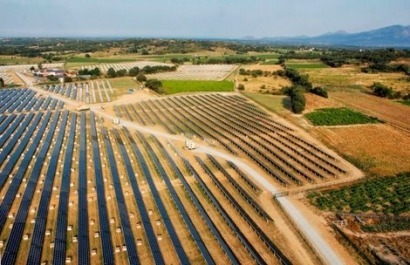
The solar and agricultural park covers a total size of 87 hectares at Ortaffa in the Languedoc-Roussillon region of southern France, close to the Spanish border. The solar plant, with a total module surface of 21 hectares, will provide clean energy for 10,000 households and is the largest PV plant Juwi has built in France so far. Special measures incorporated into the plant’s design mean that the local tradition of sheep farming and beekeeping has been revived on site and has also enabled the region’s agricultural heritage of wind-growing to rise again.
“We are really proud of this project” said Delphine Guinet, project manager at Juwi EnR, the French subsidiary of the German project developer Juwi. “It was a grand challenge in ecological as well as in economic and political terms – it took us six years to fulfill the high demands of all parties involved.”
The result is a one of a kind solar and agricultural park in which the 300,000 solar panels provide 35.5 million kilowatt hours of clean electricity. The plant has been subdivided into ten sections in order to guarantee the lowest possible impact on the environment and to preserve the surrounding nature as best as possible. This has enabled the plant to blend into the surrounding landscape with hedges, brooks and embankments integrated into the overall design concept.
Several varieties of forage crops selected by a seed producer and a sheep farmer have been sewn on approximately 70 hectares of land. The area is grazed by a flock of 200 “Rouge du Roussillon” sheep which can roam freely in the solar park. This also helps to keep the meadow in which the plant is located in perfect condition without using pesticides.
Juwi has also sown honey-bearing plants on 11 hectares of land not covered with solar panels in order to create a new habitat for the the local population of “Noire du Roussillon” bee species. These plants are being used by a local bee-keeper who has set up beehives for honey production. Juwi has also provided 4,000 vines of the two highest categories AOP (Appellation d'Origine Protégée) and IGP (Indication Géographique Protégée) to local winemakers. These will be planted on 43 hectares of vineyard.
“Our solar park allows us to increase the value of an agricultural zone, which had almost been given up said Raymond Pla, Mayor of Ortaffa. “We revived the tradition of wine-growing, beekeeping and farming in the region. As a result of the open dialogue between all parties involved, the park matches the needs of our region and thus stimulates the local economy.”
A total of 56 companies have been employed in the construction works, 40 percent of them local to the region. Financial benefits generated by the park will remain in the community and continue to enhance the local value chain for more than 20 years, even after the end of feed-in tariffs.
For additional information:

